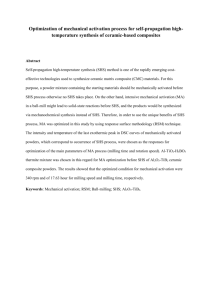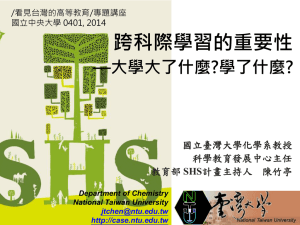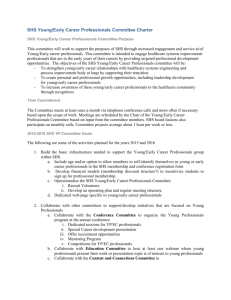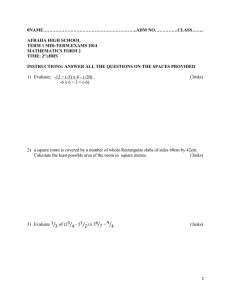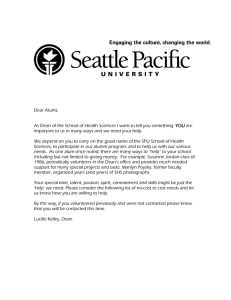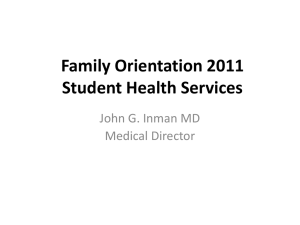Student Health Service 2014-15 Annual Report
advertisement
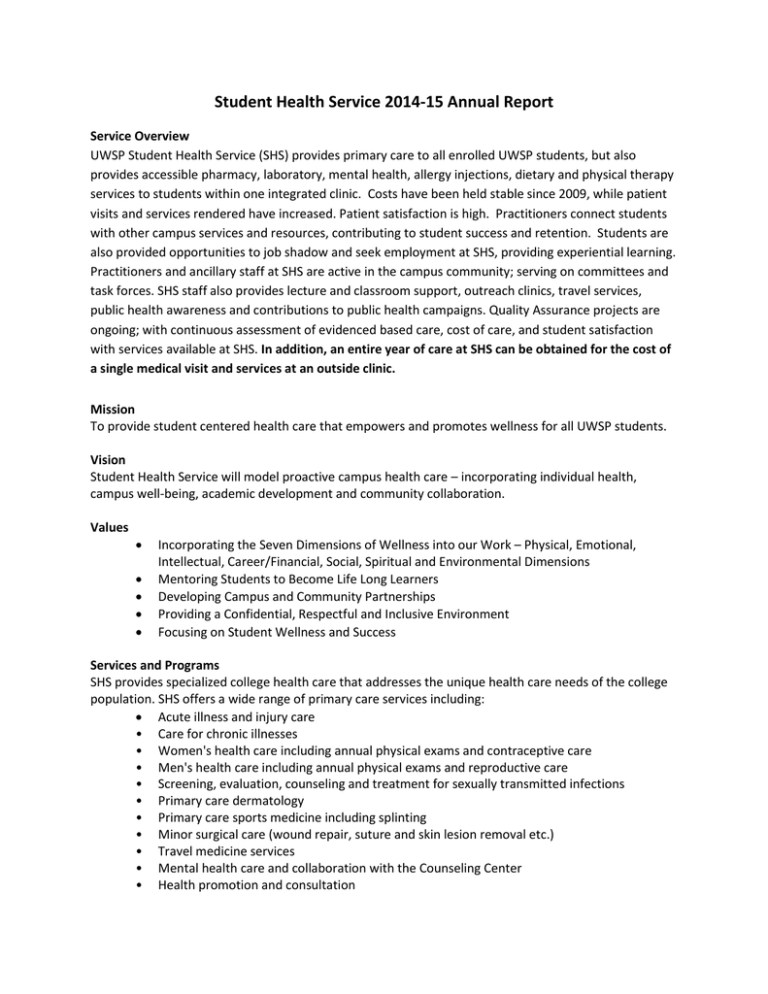
Student Health Service 2014-15 Annual Report Service Overview UWSP Student Health Service (SHS) provides primary care to all enrolled UWSP students, but also provides accessible pharmacy, laboratory, mental health, allergy injections, dietary and physical therapy services to students within one integrated clinic. Costs have been held stable since 2009, while patient visits and services rendered have increased. Patient satisfaction is high. Practitioners connect students with other campus services and resources, contributing to student success and retention. Students are also provided opportunities to job shadow and seek employment at SHS, providing experiential learning. Practitioners and ancillary staff at SHS are active in the campus community; serving on committees and task forces. SHS staff also provides lecture and classroom support, outreach clinics, travel services, public health awareness and contributions to public health campaigns. Quality Assurance projects are ongoing; with continuous assessment of evidenced based care, cost of care, and student satisfaction with services available at SHS. In addition, an entire year of care at SHS can be obtained for the cost of a single medical visit and services at an outside clinic. Mission To provide student centered health care that empowers and promotes wellness for all UWSP students. Vision Student Health Service will model proactive campus health care – incorporating individual health, campus well-being, academic development and community collaboration. Values Incorporating the Seven Dimensions of Wellness into our Work – Physical, Emotional, Intellectual, Career/Financial, Social, Spiritual and Environmental Dimensions Mentoring Students to Become Life Long Learners Developing Campus and Community Partnerships Providing a Confidential, Respectful and Inclusive Environment Focusing on Student Wellness and Success Services and Programs SHS provides specialized college health care that addresses the unique health care needs of the college population. SHS offers a wide range of primary care services including: Acute illness and injury care • Care for chronic illnesses • Women's health care including annual physical exams and contraceptive care • Men's health care including annual physical exams and reproductive care • Screening, evaluation, counseling and treatment for sexually transmitted infections • Primary care dermatology • Primary care sports medicine including splinting • Minor surgical care (wound repair, suture and skin lesion removal etc.) • Travel medicine services • Mental health care and collaboration with the Counseling Center • Health promotion and consultation • • • • • • Nutrition counseling with a Registered Dietician Physical Therapy services Pharmacy services Laboratory services Support for multiple academic and campus programs including International Programs, Health Promotion and Wellness, College of Natural Resources (Treehaven & CWES students), Sociology Department, pre-health professionals (pre-med, nursing, pre-PA , Communicative Disorders etc.), Athletics, Athletic Training, The Cupboard Food Pantry, Child Care, Education, Disability Services, Dining Services and Residential Living Consultative and public health services for the University and local community Unit Achievements Increased Demand for Services. SHS met an overall increase of 3% in demand for clinic, lab and pharmacy services which, despite a 1.8 FTE decrease in medical provider staffing, included a 6% increase in clinic visits. Retention and Success of Students. In the fall 2014 Student Health Service Survey, 11% of students (N=519) stated that the care received at SHS allowed them to stay in school. Retaining these 57 students for even just ONE additional academic year provides the University with an additional $835,322 in tuition, fees, room and board. In addition, among other departments on campus, SHS collaborated closely with the Students of Concern Team, Disability Services, Dining and Residential Living to coordinate and optimize services for students with special dietary requirements or other specific disabilities and health needs; ultimately resulting in the retention and success of these students at UWSP. Cost Effective Health Care. Since 2009, the segregated fee for Student Health Service has remained stable while patient visits and services rendered have increased. In FY16, students will pay the same segregated fee of $125.75 per semester for care at Student Health Service as they did in 2009. In addition, SHS provides many services at no additional cost to the student. Healthcare SERVICE Cost at STUDENT HEALTH SERVICE (enrolled students) Average US Cost Medical Appointments Physical Travel Consultations Medical Mental Health Visits No Charge No Charge No Charge No Charge $130-$180/visit $200-$240/visit $130-$240/visit $130-$180/visit Allergy Shots Injury/Illness Care Laboratory Services (basic blood/urine tests/throat culture) No Charge No Charge No Charge $25-$100/visit $130 and up $20-150/test Pharmacy Medications No Charge for acute care medications. Chronic and ongoing medications are charged at cost. No Charge Medication out of pocket cost $5 to several hundred dollars Flu Shots Free to $35 Walk In Cold Symptoms Nursing Clinic Personalized symptom triage: No charge. OTC medications: No charge. OTC medications price range from $3-$20 High Patient Satisfaction. A 2013-14 SHS Patient Satisfaction Survey found that student’s expectations of service were exceeded 38% of the time and expectations were met 60% of the time. Only 1% felt their expectations were not met during the visit. Also, 99% of students said they would recommend Student Health Service to fellow students. While 88% of SHS patients (per the fall 2014 SHS Student Survey) had private insurance, they chose to be seen at Student Health Service, again indicating high patient satisfaction and low barriers to accessing care. Mental Health Care and Access to Medication for the Treatment of Mental Health Diagnoses. In 2014-15, mental health visits comprised 12% of office visits overall at SHS. Students had timely access to mental health care with two Mental Health Nurse Practitioners on staff as well as a collaborating Psychiatrist for consultative case management. At SHS, the average wait time for a new mental health intake appointment was only 7 days. In the community, access to care can be delayed for weeks to months. SHS also worked closely with staff at the UWSP Counseling Center to coordinate care for mental health patients. Timely Access to Care. During the fall 2014 semester, 47.7 % of all appointments at SHS were scheduled and completed on the same day, and 37.1% of medical visits were same day appointments. There was an average of 37 total same day visits. In the 2014 SHS Student Survey, 42% of students stated they received an appointment quickly and at low cost. Experiential Learning Opportunities. SHS offered job shadowing and general medical observation opportunities for pre-Physician Assistant, pre-Pharmacy and Athletic Training students. SHS also employed students as Lab Assistants, Reproductive Health Peer Educators and Summer Camp Health Staff. Care for the LGBT Campus Community. In April, SHS staff completed Safe Zone training. In 2015, SHS expanded transgender services to include not only consultation and referrals but any necessary lab monitoring and special order medications to support the students’ transitioning process. Travel Medicine. In addition to keeping students well while they are on campus, SHS is committed to keeping students well while they travel abroad. In 2015, SHS staff provided essential group and individual travel clinic visits to approximately 100 UWSP international travelers. Students were provided with specialized immunizations such as Yellow Fever Vaccines and personally customized medication options, as well as one-on-one pharmacy consultations. Outreach Programming. SHS offered multiple avenues for outreach education and care for UWSP students. Clinicians travelled to Treehaven and the Central Wisconsin Environmental Center to provide information and group clinic visits to prevent tick borne illness, along with the distribution of preventative prescriptions for tick borne illness. In consultation with SHS staff, student Reproductive Health Peer Educators provided outreach to the residence halls and arranged educational sessions for students outside the clinic. Pre-professional Experience Health Screening and Evaluation. SHS provided the required health screening, tuberculosis testing, verification of immunity to infectious disease and immunizations for many student internship programs and pre-professional student employment opportunities on campus. Promotion of Wellness and Public Health. SHS staff promoted wellness and public health through cooperation with campus and the community (i.e. Tobacco Free Campus and Smoking Cessation Visits, AODA Management Team and Task Force, Zombie Run for Alcohol Awareness, Safe Zone Training, Campus Connect Suicide Prevention Training, Ebola Preparation, Domestic Violence and Assault Awareness and Training). SHS also promoted wellness on campus by providing approximately 1200 influenza vaccinations to students at NO cost to the student. SHS sent out health alerts and information through e-mails, the UWSP website, social media, the Pointer, SPTV, classrooms and residence halls. SHS actively collaborated with local health care providers and hospitals. SHS worked with the Portage County Health Department to manage communicable and reportable diseases by providing barrier free access for students to treatment and education regarding prevention and containment. SHS also actively participated in the Wisconsin State Lab of Hygiene Respiratory and Enteric Disease Surveillance programs. Student Satisfaction Survey. Administered in the fall of 2014, the Student Health Service Student Survey (N=519) provided insight into the student experience at SHS: SHS Impact on Students 45% 40% 35% 30% 25% 20% 15% 10% 5% 0% • Summer Camp Health Office. SHS provided 24 hour staffing and physician oversight of the health office as required by the State for summer camps held at UWSP. Disaster Preparedness. SHS worked closely with UWSP Risk Management and local entities such as the Portage County Health Department and St. Michael’s Hospital to develop Infectious Disease (i.e. Ebola) Preparedness and Disaster Preparedness plans. SHS staff were trained in Ebola response measures and provided necessary Ebola and travel screening at clinic visits. Insurance Options. SHS provided students with information and access to the UW System recommended health insurance plan as well as education about the Affordable Care Act and insurance options through the health insurance exchanges. SHS also educated and assisted students in applying for and obtaining reproductive health care coverage under the Wisconsin Family Planning Waiver. Additional SHS Outreach and Camus Program Support: o SHS resource tabling: First-Year Orientation, ViewPoint Days, Transfer Orientation – multiple SHS staff members o Upward Bound program support - Kathy McGinnis, MD o Students of Concern Team – Bonnie Samuelson, MD o AODA Management Team – Jen Sorenson, PA-C o AODA Task Force – Barbara Seiser, FNP-C o Tobacco-free Campus Leader – Jen Sorenson, PA-C o Faculty Senate – Kathy McGinnis, MD o University Green Fund Committee – Kathy McGinnis, MD o Chemical Hygiene Committee – Kelly Michalski o Student Affairs Functional Teams/Committees: Diversity – Rita Thomas, FNP-C, PA-C Student Success – Kaia Durall, PA-C Wellness – Jen Sorenson, PA-C Auxiliaries – Jon Sambs, PharmD Communications/Marketing subcommittee – Barbara Seiser, FNP-C Professional Development – Kelly Michalski o Presentations: SHS Overview – English as a Second Language Students and International Students – Jen Sorenson, PA-C Residential Living Student Leader Training – Bonnie Samuelson, MD Tick-borne Disease and Prevention - Treehaven and CWES students –Jim Zach, MD, Bonnie Samuelson, MD, Kay Lockwood, MD, Kathy McGinnis, MD, Barbara Seiser, FNP-C Travel Clinics – multiple clinics based on destination – Jim Zach, MD, Bonnie Samuelson, MD, Kaia Durall, PA-C, Rita Thomas, FNP-C, PA-C, Jon Sambs, PharmD Lectures and classroom support – Sociology 368 – Kathy McGinnis, MD Drug & Diet Interactions– Dietetics Students – Jon Sambs, PharmD Healthy Sexuality – HP/W 102 The Healthy American – Jen Sorenson, PA-C Clinic Overview The top five diagnoses were: Anxiety Pharyngitis Depression Viral Syndrome STD Screening Service Indicators Total clinic, lab and pharmacy utilization Office visits Lab procedures Prescriptions Mental health diagnoses (as percent of total diagnoses) Dietitian visits Physical Therapy visits Travel – group or clinic visit Treehaven and CWES tick clinic visits Cold Clinic visits Tuberculosis screening Unique patients Average number of visits per patient Average time to appointment – primary care Average time to appointment – mental health intake Female patients Male patients 2011-12 2012-13 2013-14 2014-15 24,821 24,240 *23,727 24,561 9,825 11,478 *10,318 **10,927 /11,052 //8,540 8,892 8,635 ^3,944 4,222 4,517 4,999 12% 8% 9.1% 12.2% 135 73 104 97 130 131 137 118 135 134 108 350 329 83 674 700 3,136 3,817 3,740 3,849 2.9 3.2 3.2 2.8 3.3 days 7.7 days 66% 63% 62% 70% 34% 37% 38% 30% *corrected from previous annual report due to accounting error **reflects a 1.8 FTE decrease in clinical staff due to staff vacancies/leaves /denotes number of labs ordered //denotes number of labs completed ^ reflects temporary decrease in pharmacy hours while hiring a new pharmacist spring semester 2012 Inclusive Excellence Services at Student Health Service are based on the diverse and unique needs of each individual student and are offered in an inclusive manner to all UWSP students. SHS staff has completed Safe Zone Training. SHS offers a gender neutral bathroom and strives to use gender neutral terminology. SHS hiring processes are consistent with Equity and Affirmative Action guidelines. 2015-16 Student Health Service Goals 1. Develop a communication plan to highlight experiential learning opportunities provided at SHS thereby increasing awareness of assessable outcomes generated through these opportunities. 2. Develop a formalized plan in regards to employing and/or hosting student learners each year. Explore options to expand experiential learning opportunities for students including job shadowing, internship, preceptorship and/or student employment. 3. Develop and distribute a biannual SHS newsletter. 4. Work with other UWSP departments to support and promote the seven dimensions of wellness on campus. 5. Provide trained staff personnel to assist students with questions about insurance coverage and reimbursement. 6. Work to gain further knowledge of and build partnerships with community services outside our scope of practice including dental health and complementary medicine (massage, chiropractic, etc.). Continue to explore additional options for collaboration to potentially provide these services at SHS. 7. Continue to provide high quality comprehensive medical care and education to students with an emphasis on individual wellness. 8. Continue to develop and nurture a student centered, cross cultural and inclusive climate. 9. Continue to develop assessment methods with an emphasis on learning outcomes. 10. Continue to evaluate current scheduling and patient flow to maximize efficiencies. 11. Continue to support and promote the planning, development and construction of a comprehensive Health and Wellness Center on campus.
